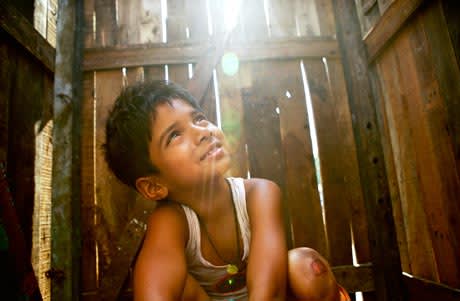In the short months between being an unheralded, Indian-set movie by an English director with a knack for stylistic impact to being an Oscar juggernaut, Slumdog Millionaire acquired more than a little baggage; it's challenging to come to it now without an almost overwhelming sense of its back-story, its challenges and its supposed greatness. Like Lost In Translation before it, Slumdog doesn't benefit from the hype; it succeeds most as a surprising discovery, an unexpected treat. Fortunately, this DVD issue, completed and scheduled before its Oscar campaign, retains some charming modesty that benefits the presentation. It's the story of friends Jamar and Salim, and a fated love, framed by Jamar's journey on the Indian edition of Who Wants to Be A Millionaire? As he succeeds on the show, we see the circumstance that taught him the answer to each question. It's a beautiful story, told with the pace and vigour of a thoroughly Western director, with the utmost respect for Indian realities. In many ways, Slumdog Millionaire is an accumulation of world cinema; it's global pop in the best way, refusing to pander specifically to Western audiences — parts are in Hindi but most are in English — while utilizing a filmic language mostly familiar the world over, one of polished action and quick paced storytelling. Boyle (and his Indian co-director Loveleen Tandan) tell an exciting, engaging story; their goal is not to "honour" Indian cinema any more than it is to make India seem more Western (there's no "whitey" character to represent "us" to an Indian "them") — the closest they come is an appropriate-feeling dance sequence that ends the movie. The story of Jamal and Salim is told in three parts by actors of three different ages; in many ways, the younger actors are the most authentic and engaging. But what's exciting about Slumdog is in some ways its most mainstream characteristics; as global cinema, it's not "arty" or obscure, it's not out to prove its rightness against a more hegemonic Hollywood, and it's not flaunting its linguistic barriers as art-house authenticity. DVD extras include a relatively modest making-of and some deleted and extended scenes, but the palpable passion and behind-the-scenes insight come through on two commentary tracks: one by Boyle and actor Dev Patel (the eldest Jamal); the other by producer Christian Colson and screenwriter Simon Beaufoy. My only complaint is that the brilliant music by composer A.R. Rahman deserves its own showcase.
(Searchlight Pictures)Slumdog Millionaire
Danny Boyle and Loveleen Tandan

BY James KeastPublished Mar 27, 2009



